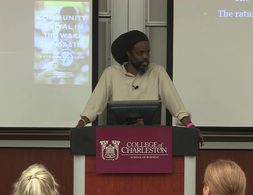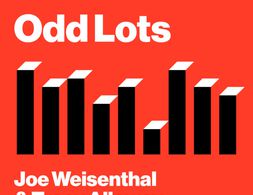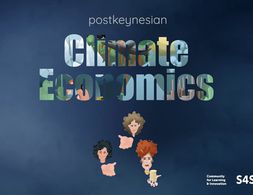255 results
Irene van Staveren, professor of pluralist development economics, presents her pluralist teaching method for the introductory level. Based on her textbook “Economics After the Crisis: An Introduction to Economics from a Pluralist and Global Perspective” she suggests to focus on real-world problems and pari passu apply economic theories such as Social economics, Institutional economics, Post-Keynesian economics as well as Neoclassical economics without wasting time to single out the latter. Besides pointing out advantages of such a pluralist method Irene illustrates her approach based on interesting topics such as growth or feminist economics.
In this talk, Virgil Henry Storr, a Research Associate Professor of Economics in the Department of Economics at George Mason University, talks about his research into to post-disaster recovery and the role that social entrepreneurship plays in rebuilding the communities and social networks that get disrupted, or entirely eliminated.
During his life, Keynes was credited with, amongst other things, with helping to save capitalism from the Great Depression, funding the war against the Nazis and building post-war decades of growth and rising prosperity. And when the global crisis struck in 2008, it was his ideas that the world's leaders turned to help avoid another depression.
In this post, Rethinking Economics sets out what it means to decolonise economics education and how we can do that. The article first breaks decolonising down into a "mind-set" and a "process", then applies this process to economics education. It finishes with a reading list and some suggested actions to get you started decolonising economics today.
This Blog Post describes the U.S. federal reserve money system from the perspective of the Modern Monetary Theory (MMT). Therefore it presents a theory of money creation, gives simple examples how this influences the economy and the historical process of why the monetary system of the US has developed this way.
The plumbing of the financial system is coming under strain like never before. On this week’s podcast, we speak with two legendary experts on how the money system works: Zoltan Pozsar of Credit Suisse and Perry Mehrling of the Frederick S. Pardee School of Global Studies. They explain the extreme level of stress we’re seeing, what the Fed has done to alleviate, what more needs to be done, and what the post-crisis future may look like.
Le PIB fait l’objet de critiques régulières. En avril dernier, le Parlement a voté, sur la proposition de la députée Eva Sas (EELV), une loi prévoyant que des indicateurs alternatifs au PIB guident les politiques publiques. Mais le choix de ces indicateurs alternatifs soulève un certain nombre de questions. Par Géraldine Thiry (Université de Louvain, Forum pour d’autres indicateurs de richesse) et Adeline Guéret (étudiante à l’ENSAE, stagiaire à l’Institut Veblen).
Le gouvernement français publie cette année, parallèlement au dépôt du projet de loi de finances, un rapport présentant " l’évolution, sur les années passées, de nouveaux indicateurs de richesse, tels que les indicateurs d’inégalités, de qualité de vie et de développement durable." Cette publication fait suite à l’adoption définitive au Parlement, en avril 2015, de la proposition de loi visant à prendre en compte de nouveaux indicateurs de richesse dans la définition de politiques publiques. L’article unique de cette loi prévoit "une évaluation qualitative ou quantitative de l’impact des principales réformes engagées l’année précédente et envisagées pour l’année suivante, notamment dans le cadre des lois de finances, au regard de ces indicateurs et de l’évolution du produit intérieur brut." Cette loi marque constitue donc une première étape dans la remise en cause de la centralité du PIB (produit intérieur brut), comme indicateur central du progrès de notre société. Comme l’explique la vice-présidente de la Commission des Finances de l’Assemblée nationale, la députée de l’Essonne, Eva SAS, à l’origine de cette loi, il est nécessaire de " renouveler la pensée économique " parce que nous sommes entrés " dans une période post-croissance qui nous impose de commencer à réfléchir autrement " (…) " Il faut remettre du long-terme dans les politiques publiques et prendre en compte ce qu’on lègue aux générations futures « . En consacrant son rapport annuel 2015 à la question des nouveaux indicateurs, l’Idies s’inscrit pleinement dans le cadre des missions qu’elle s’est donné depuis son origine : agir pour que soient réunies les conditions nécessaires pour que tous les citoyens puissent accéder à une information économique et sociale de qualité. Le choix des indicateurs rendant compte de l’état de notre économie et de notre société a une dimension technique. Mais il est surtout profondément politique. Il ne peut donc être laissé aux seuls experts et doit au contraire être placée au coeur de la délibération démocratique. C’est toute l’ambition de ce rapport que d’y contribuer.
Since the 1980s, the financial sector and its role have increased significantly. This development is often referred to as financialization. Authors working in the heterodox tradition have raised the question whether the changing role of finance manifests a new era in the history of capitalism. The present article first provides some general discussion on the term financialization and presents some stylized facts which highlight the rise of finance. Then, it proceeds by briefly reviewing the main arguments in the Marxian framework that proposedly lead to crisis. Next, two schools of thought in the Marxian tradition are reviewed which consider financialization as the latest stage of capitalism. They highlight the contradictions imposed by financialization that disrupt the growth process and also stress the fragilities imposed by the new growth regime. The two approaches introduced here are the Social Structure of Accumulation Theory and Monthly Review School. The subsequent part proceeds with the Post-Keynesian theory, first introducing potential destabilizing factors before discussing financialization and the finance-led growth regime. The last section provides a comparative summary. While the basic narrative in all approaches considered here is quite similar, major differences stem from the relationship between neoliberalism and financialization and, moreover, from the question of whether financialization can be considered cause or effect.
This paper presents an overview of different models which explain financial crises, with the aim of understanding economic developments during and possibly after the Great Recession. In the first part approaches based on efficient markets and rational expectations hypotheses are analyzed, which however do not give any explanation for the occurrence of financial crises and thus cannot suggest any remedies for the present situation. A broad range of theoretical approaches analyzing financial crises from a medium term perspective is then discussed. Within this group we focused on the insights of Marx, Schumpeter, Wicksell, Hayek, Fisher, Keynes, Minsky, and Kindleberger. Subsequently the contributions of the Regulation School, the approach of Social Structures of Accumulation and Post-Keynesian approach, which focus on long-term developments and regime shifts in capitalist development, are presented. International approaches to finance and financial crises are integrated into the analyses. We address the issue of relevance of all these theories for the present crisis and draw some policy implications. The paper has the aim to find out to which extent the different approaches are able to explain the Great Recession, what visions they develop about future development of capitalism and to which extent these different approaches can be synthesized.
Understanding the financial crisis from four very different economic theories: Social Economics, Institutional Economics, Post Keynesian economics.
The Routledge Handbook of Heterodox Economics presents a comprehensive overview of the latest work on economic theory and policy from a 'pluralistic' heterodox perspective.
Contributions throughout the Handbook explore different theoretical perspectives including: Marxian-radical political economics; Post Keynesian-Sraffian economics; institutionalist-evolutionary economics; feminist economics; social economics.
As the current economic crisis spreads around the globe questions are being asked about what king of capitalist or post-capitalist economy will follow. There is increasing talk of the need for stringent economic regulation, the need to temper greed and individualism, to make the economy work for human and social development.
How did the industrialized nations of North America and Europe come to be seen as the appropriate models for post-World War II societies in Asia, Africa, and Latin America? How did the postwar discourse on development actually create the so-called Third World? And what will happen when development ideology collapses? To answer these questions, Arturo Escobar shows how development policies became mechanisms of control that were just as pervasive and effective as their colonial counterparts.
The Austrian tradition in economic thought had a profound influence on the development of post-war economics including neoclassical orthodoxy, game theory, public choice, behavioral economics, experimental economics and complexity economics.
This lively introduction to heterodox economics provides a balanced critique of the standard introductory macroeconomic curriculum. In clear and accessible prose, it explains many of the key principles that underlie a variety of alternative theoretical perspectives (including institutionalist economics, radical economics, Post Keynesian economics, feminist economics, ecological economics, Marxist economics, social economics, and socioeconomics).
The book provides an excellent comparative perspective on New Keynesian "New Consensus" economics and Post-Keynesian Economics at a beginner level. It also offers an interactive tool to understand how the economic models work, especially from a heterodox / pluralist perspective.
This video provides a brief introduction to post-keynesian economics and how the school of thought would tackle climate change.
This content submission has two parts: (1) a link to the post by Wolf Richter on deterioration of US subprime credit card debt and loans, driven in part by the overuse of hedonic quality adjustments in the Consumer Price Index (CPI) used by the US Bureau of Labor Statistics, and (2) to introduce Exploring Economics to the website Naked Capitalism, which is an effort to promote critical thinking through the medium of a finance and economics blog and fearless commentary.
Quinn Slobodian a historian of modern Germany and international history analysis of current development in the Mont Pèlerin Society and therefore neo-liberalism. He sees neo-liberalist thinkers less as believers in the self-healing power of markets, but more as ordo-liberal Globalists who wanted to protect the markets from post-war politics and especially mass democracy. Their goal of global capitalism is still strong, however sceptics in the Mont Pèlerin Society are rising, which see international migration as a threat to Globalisation. Therefore, turning neo-liberal policies away from international institutions like the EU back towards the national states as new defenders of the markets as well as international trade and investments.
(A development which can be seen in the Friedrich A. von Hayek-Gesellschaft and especially in the "liberal" wing of the German rightwing populist party AfD)
In this short video, John Holmwood problematizes Marxian Economics from a post-colonial perspective.
This blog post reviews "Democratizing Finance", an edited volume that analyses and provides policy proposals to ensure that the financial system serves the public good. Mquzama undertakes the task of summarising the main takeaways from each essay in the book as well as an exposition of its shortfalls. While he acknowledges the necessity of the book's reimaging capitalism and the financial system in a way that is practical within the current economic and political structures, he also highlights its failure to look beyond the United States of America.
This module examines current socio-political issues through the lens of pluralism, that is pluralism of theory, pluralism of method and interdisciplinary pluralism
Modern Monetary Theory (MMT) is a school of monetary and macroeconomic thought that focuses on the analysis of the monetary and credit system, and in particular on the question of credit creation by the state.
This article outlines the fundamental challenges of democratically planned economies and categorises proposed models into six groups, each of which approaches planning and coordination at different levels of authority and between myriad economic units in a particular way, taking into account efficiency as well as democratic principles and environmental and social sustainability. Through a classification system based on decision-making authority and mediation mechanisms, the article provides a framework for understanding and comparing these models. By examining their different approaches, it offers insights into the complexities and potential paths of democratically planned economies in the 21st century.
This unique up-to-date volume not only provides state-of-the-art discussions of the most recent developments in modern macroeconomics but also includes a series of interviews with leading economists that shed new light on the major intellectual and policy issues of the 1990s. The book is at once an invaluable text and a superb overview that will be welcomed by teachers and students alike.
Marxian Political Economy focuses on the exploitation of labour by capital. The economy is not conceived as consisting of neutral transactions for exchange and cooperation, but instead as having developed historically out of asymmetric distributions of power, ideology and social conflicts.
Who are the 86 laureates of the economics “Nobel prize”, and what are their scientific contributions? This course will present the major concepts, theories, and results in modern economics, through an overview of the work of a selection of economics “Nobel prize” as well as Leontief prize laureates.
The most influential and controversial economist of the twentieth century, John Maynard Keynes was the leading founder of modern macroeconomics, and was also an important historical figure as a critic of the Versailles Peace Treaty after World War I and an architect of the Bretton Woods international monetary system after World War II.
Feminist economics is a key component of the movement for pluralism in economics and one that has, to some extent, been acknowledged by the mainstream of the profession. It seeks to highlight issues which affect women because (it claims) they have not traditionally been recognised in a field dominated by men. On top of this, it seeks to carve out a space for women in the discipline, both for intrinsic reasons of fairness and diversity and because it means that women’s issues are more likely to be highlighted going forward.
The core idea of ecological economics is that human economic activity is bound by absolute limits. Interactions between the economy, society and the environment are analysed, while always keeping in mind the goal of a transition towards sustainability.
L’économie politique marxiste se focalise sur l‘exploitation du travail par le capital. Elle ne voit pas l'économie comme un ensemble de transactions neutres à des fins d’échange et de coopération, mais au contraire comme un développement historique conflictuel résultant de luttes sociales, d’une certaine idéologie et d’une distribution asymétrique du pouvoir.
Dependency in Central and Eastern Europe - Self-reliance and the need to move beyond economic growth
In this essay, the author takes a critical perspective on the pursuit of growth as the solution for providing for environmental sustainability and economic stability in the countries of Central and Eastern Europe.
Drawing from the framework of dependency theory and presenting brief insights into European core-periphery relations the author then argues for the implementation of an alternative strategy to development that is built around the concept of self-reliance.
Nous utilisons des cookies sur notre site Web. Cliquez sur Accepter pour nous aider à améliorer constamment Exploring Economics !





























